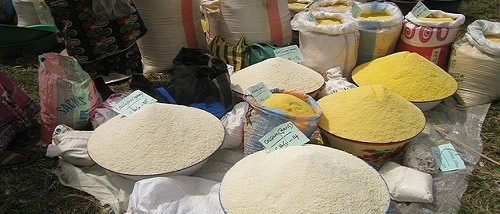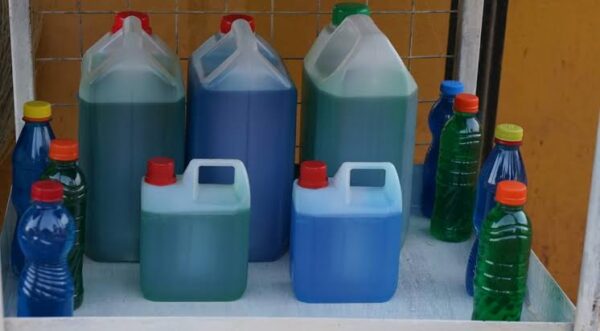How To Process And Export Nigerian Vegetables
Shippers’ Guide is the learning page of MMS Plus newspaper. This week we extract some tips on twenty-four hours packaging and export of Nigerian vegetables to foreign countries.
Globally, there is a huge demand for Nigeria’s fresh fruits and vegetables and the supply seems short, thus, there is the need for more involvement in agri-food exports from Nigeria, experts in the business have said.
Nigeria vegetables come in various types; they include Amaranthus (Tete) , TelFairia, (Ewedu), Corchorus olitorius (Ugu) Others are Ukazi, Ugba, Bitter leaf, etc. Almost all the vegetables in Nigeria can be produced for the fresh market 4-6 weeks after planting. It can be produced all year round depending on the availability of water.
Method of exporting Nigeria Vegetable:
You can export it fresh or dry. To export dry, you will need to wash before you take it to the machine for drying. You can dry it at a temperature of 42 to 45 degrees. After the drying you will sort the bad ones and make sure the one you are sending is free from foreign particles. If you are exporting it fresh just make sure it is free from foreign particles and it is ready for export. The dry vegetable is good for the US and far east while the fresh vegetable is very good for the UK market
About the dying machine:
You can buy from the Federal Institute of Industrial Research Oshodi (FIIRO) while you can get the locally fabricated machine for about N500,000. If you don’t have the money to buy one you can always take your vegetable to existing foodstuff exporters that have the drying machine.
Packaging:
The packaging depends on the specification of the buyers, e.g. 25 grams 50 grams, 100grams, 1 kg, 2 kg 5 kg. You will need a Ceiling machine. Make sure it is properly labeled. Include your company, name and address on the Nylon. You can then arrange your vegetable in a special carton for vegetable export. You are the one to do the carton locally branded in your company name and other contact information of your organization.
Quarantine services:
Quarantine service is a regulatory body for vegetable export, you will need to register with them before you can export any vegetable to the foreign Countries, they will need to certify it OK for consumption. Vegetable farmers producing Made in Nigeria are also working with the quarantine services because the quarantine officials go to their farms to fumigate the vegetables from time to time.
Freight Forwarder:
The freight forwarder will help you pay the freight charges and the documentation. However the freight changes are not constant this is due to the up and down movement of the exchange rate.
Documents needed to export Nigerian vegetable to the foreign Countries:
You will need two certificates to export Nigerian vegetables to the foreign Countries, one is an export license from the Nigeria export promotion Council (NEPC) you can get it with less than 48 hours with about N10,000, you must have a limited liability company to obtain an export license, the other certificate you need is the one from the Nigeria quarantine services you will need to pay their registration fee of N50,000, then you will pay N25,000 for the Vegetable exporters union. If you don’t have money to do this you can leverage the membership of the existing member to export your vegetables.
How to get your vegetable:
Your vegetables must be collected from registered farmers with the Nigeria quarantine service, they have a list of registered vegetable farmers and they go to their farms to fumigate the vegetables and make sure that the vegetables are free from fungi or any bacteria.
It takes only 6hrs for the vegetable to get to London and, if you are exporting fresh vegetables it will still remain fresh. You can only export vegetables on Monday, Tuesday and Wednesday, while you can export any other food product on any day of the week.
Packaging to prevent perishing
You need to understand the plants formation and how they live, Ogunyemi counsels, saying “the moment you harvest, they start dying – if you can rehydrate, then you can probably help them live longer and then don’t forget they expire and what that means is that they can easily start cooking themselves, so you have to work out the best technique.
“Transport to the destination centres (wholesale markets, superstores) must be organised in such a way that the quality of the products remains unchanged. This is one of the ‘bottlenecks’ in the chain which also impedes trade between the less-developed countries. For the transport of fresh fish, the use of refrigerated facilities is essential,” Ramos also notes.
To ensure proper preservation and distribution of these products, Ogunyemi says an exporter must take the perishable nature of fresh products into consideration to determine their handling, transportation, preservation and consumption.
Current and possible challenges would-be exporter may face
Lack of proper and internationally acceptable infrastructure within export terminals presents major challenge exporters of perishable food products face on a daily basis. According to Ogunyemi, “lack of temperature controlled areas at the airport is a big minus for the country. Ghana and Ivory Coast have temperature control areas, but Nigeria doesn’t.”
In an effort to preserve the freshness of his farm produce, Ogunyemi says he loads the products into temperature-controlled trucks from his farms to the airport, but loses control over the processes when the products get into the airport. According to him, if care is not taken, 35 degree heat at the airport terminals could cook the vegetables before they get to their destinations.
Another challenge is that there are only two airlines that provide early airlifting services in Nigeria. Add to that is the exponentially high cost of air cargo and fuel prices to produce the said vegetables.
“If we want to be serious about exports in this country, we must get our infrastructure right. Cost of aviation is very high. The cost of air cargo is very high – a cargo from Costa Rica which is in South America to the UK costs an equivalent of 30 cents, in Nigeria, we pay over a dollar for a shorter distance. From Costa Rica to the UK is about 14 hours, while from Nigeria to the UK is six hours and we are paying over a dollar per kilo,” he says.
Profitability:
All vegetables are packed in 50 gram, 100 grams, 150 grams etc depending on the specification of the buyer. A bunch of Ugu leaf is being sold for N50 per bunch in our local market and 10 bunches which are 4kg will make a carton which is N500. The profit on investment per carton is N500; you have the right to give the importer the minimum order which he could order for, this may range from 500kg to 1000kg (1 tone) which is 125 Cartons to 250 Cartons respectively. Which is N62, 500 to N125,000 Profit.
This calculation is based on the premise that you are buying at the local market for N50 but since you are buying in bulk the price of a bunch will not be more than N30. However if you are exporting vegetables the importer oftentimes also orders for other foodstuffs like Egusi, ogbono, dried pepper, ground crayfish and other foodstuff being consumed by Nigerians based in the UK and this order will definitely skyrocket your profit margin.
Opportunity for small investors:
As a small investor, you can start with small package foodstuff, the startup capital is less than N100, 000, while the return on investment is quite high, a lot of contract are coming from foreign Countries to meet the demand of over 30Million Nigerians that sojourn in this countries and a lot of Nigerians are opening a Grocery and foodstuff market in these Countries, these people are looking for regular suppliers.
You can get buyers by registering at different trade porters, or getting listed in the African foodstuff directories.








